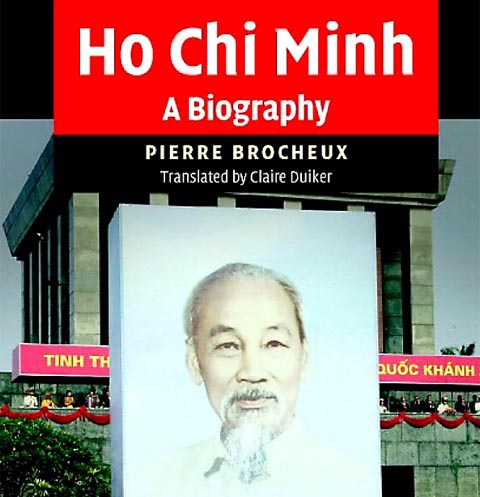Ho Chi Minh: A Biography by Pierre Brocheux/translated by Claire Duiker (Cambridge)
Ho Chi Minh
It was an internationally acknowledged fact, when World War II was over, that Vietnam needed "protection". The French were eager to repossess their former colony. Chiang Kai-shek's government wanted to welcome Vietnam into "the great Chinese family." Franklin Roosevelt claimed that Vietnam would flourish under American stewardship. The only dissenter to these magnanimous offers was Vietnam.
On September 2, 1945, a declaration of independence announcing the birth of the Democratic Republic of Vietnam was read aloud by Ho Chi Minh. Middle-aged and physically frail, this was a man who had been so sick with malaria that he had been, only months before, “ a bunch of bones, staring with glazed eyes,” a man of many names who had been away from his country for thirty years and was now its figurehead.
Nguyen Tat Thanh was decades away from being Ho Chi Minh in 1911, when he arrived in France from Vietnam, an easily scandalized twenty-one-year-old who immediately asked “Why don’t the French civilize their own people instead of trying to civilize us?” Changing his name to Nguyen Ai Quoc, Nguyen the Patriot, he became a political activist, petitioning the Allies at Versailles in 1919 for Vietnam’s equality, autonomy and political freedom.
Lenin’s writing persuaded Quoc that revolution would end colonial oppression, and led him to Communism and to Moscow, where he attended Lenin’s funeral, standing for hours in the frigid cold that left scars on his hands from frostbite.
Quoc traveled, studied and forged political ties in Russia, China, Southeast Asia and Europe. Delightful, diplomatic and blessed with a gift for languages, he was described by the poet Osip Mandelstam as “a man of culture…the culture of the future.”
Arrested and imprisoned in Hong Kong as a Communist criminal, Quoc faced extradition to Vietnam where he was faced with execution for “plots and assassinations.” His charm saved him. A British solicitor, Frank Loseby, visited Quoc and later wrote, “After thirty minutes, I was entirely won over.” Quoc’s death from tuberculosis was announced, and, with Loseby’s help, he was disguised as a Chinese scholar and escaped to Russia. Years later he reappeared in Vietnam as the resurrected Nguyen Ai Quoc, after having established himself as Ho Chi Minh, Well of Light, leader of the Viet Minh resistance movement and the man who would spearhead his country’s battle for freedom.
Ho’s life was defined by politics and his passion for Vietnam’s liberation; this biography is dense with historical and political background. Yet the man shines through the thicket of facts, with his wit and his poetry making Ho alive on the page: a Confucianist who adapted to Stalin and Mao, a man who fought France but loved the French, a poet who, while living in a cave for a year, wrote “Really, the life of the revolutionary is not lacking in charm.” Pierre Brocheux brings out a concise but skillful portrait from history’s obscuring layers of sainthood and demonization, allowing Ho to declare once more, “I am a normal man.”
